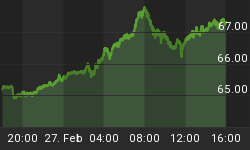Charles Hugh Smith and Gordon T Long discuss the dramatic impacts the recent fall in energy prices is having and will have on global financial markets.

Situational Analysis
The impact of lower oil is financial, political and geopolitical.
Lower oil revenues will impact:
- Oil-exporters' revenues,
- Monetary policy of central banks,
- Trade flows and
- Global financial markets.
Lower state revenues will pressure:
- Oil-dependent governments such as Russia, Venezuela and Iran, and
- Destabilize the geopolitical order as weakened oil exporters sink into recession or political turmoil.
Reduced Global Liquidity Flows

Four Likely Causes
- Shale Oil,
- Weak Global Demand,
- A Geo-Political Clash,
- Financialization of Oil

Consequences of $68/BL Oil
(Richard Duncan's "Liqudity Gauge" Watch)
- Consumer "Tax Cut": Consumers will be better off. Lower gasoline prices will be like a tax cut for the middle class, who will be able to spend more on other goods.
- Smaller US Trade Deficit: The US trade deficit will become smaller as the cost of oil imports falls (although this will be partially offset since Americans are likely to use their savings from a lower gasoline bill to buy more consumer goods made overseas). A lower trade deficit will boost GDP.
- Shift In Central Bank Stances: Lower oil prices will mean more downward pressure on consumer prices and a greater risk of deflation. The fear of deflation is likely to cause the Fed and the Bank of England to delay their plans to increase interest rates, while it may force the European Central Bank and the Bank of Japan to accelerate their asset purchases.
- Lower Sovereign Bond Yields: In most countries, government bond yields have already fallen in response to the increasing disinflationary/deflationary pressures that will result from lower oil prices. Government bond yields in a number of European countries fell to record lows last week.
- Sovereign Fiscal Pressures: The finances of the oil exporting countries will suffer. The currencies of Russia, Norway, Venezuela and Nigeria have already fallen significantly, reflecting the deterioration in those countries' economic prospects.
- Production Breakeven Costs: Lower oil prices are likely to put some high cost producers out of business. Canadian oil sands look particularly vulnerable. Some of the marginal shale oil producers in the US may also go to the wall. As bankruptcies occur, defaults on energy junk bonds are likely to rise significantly. At this stage, I don't believe that the losses in the junk bond market will be significant enough to cause a new financial sector crisis. Nor do I believe that so many wells will shut down in the United States that US oil production will begin to fall. Production costs have been falling rapidly and are likely to continue falling. Oil prices will have to fall considerably further before most of the new shale oil production becomes unprofitable. Of course, the possibility that oil will fall much further can't be ruled out. It was $20 per barrel not all that long ago.
- Reduced Capital Flows: Finally, the reduction in the US trade deficit will mean a reduction in capital inflows into the US. (Capital inflows are the mirror image of the Current Account Deficit, since every country's balance of payments must balance.) The reduction in capital inflows will reduce the upward pressure on US asset prices that has come from this source in the past.
Video: The Oil-Drenched Black Swan
with Charles Hugh Smith & Gordon T Long
28 Minutes















